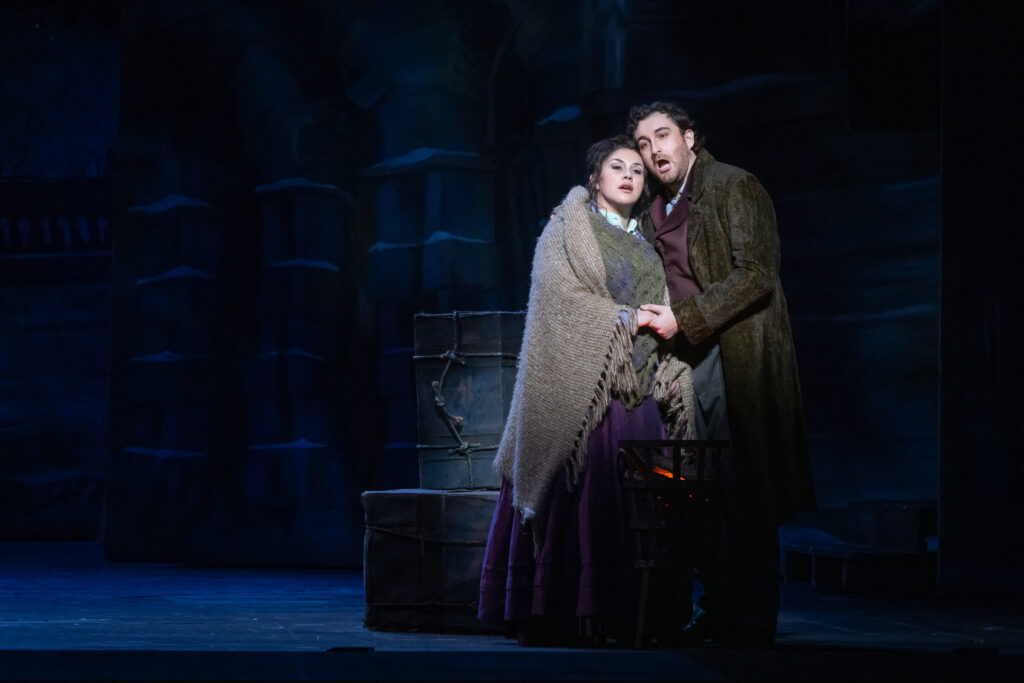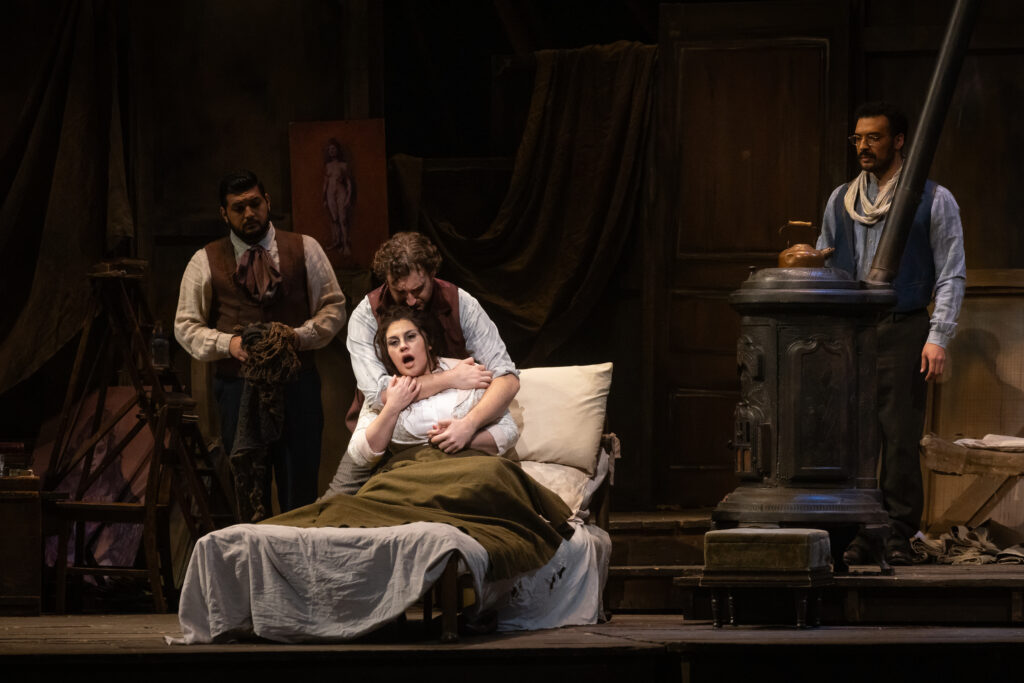YARITZA VÉLIZ | THE VOICE THAT ELEVATES PUCCINI IN LA BOHÈME AT HGO

Soprano Yaritza Véliz arrives in Houston from Coquimbo, Chile to perform the voice of Mimi, the title character in La Bohème by Italian composer Giacomo Puccini. This timeless tale is one of the most passionate love stories in opera. Yaritza Véliz’s dedication to the audience from the stage is complete. Her rich, bright, melodious soprano voice and stage presence capture our hearts, one of her triumphant trademarks.
Yaritza’s story is inspiring and she has already made her mark as the first Chilean soprano, representing Latin America, to enter the Jette Parker Young Artist program at the Royal Opera House.
Most recently, during the 2023-24 season, she performed the role of Mimì in La Bohème for the Royal Ballet and Opera of London; Violetta in La traviata for the Norwegian National Opera; Donna Elvira in Don Giovanni for the Opéra de Rouen; Giulietta in I Capuleti e I Montecchi for the Opéra national de Lorraine; and Adina in The Elixir of Love for the Santa Fe Opera. Her career is brilliantly on the rise.
We had the great pleasure of attending the Houston Grand Opera and witnessing her great performance in La Bohème. During this exclusive interview, Yartiza Véliz tells us about her childhood, her career as a soprano, the challenges she faces as a performer, and she gives us the inside scoop on her upcoming and most important role to date: becoming a mother.
CHILDHOOD IN CHILE
Yaritza, during your childhood, could it be said that you grew up in a musical environment?
No, the truth is that nobody was a musician in my family. My mom was a kindergarten teacher. My dad works in heavy machinery, transporting material in the mines. So I have no artistic streak in my family.
But my mother, being an educator, encouraged me to sing and started singing with me when I was very little, almost three years old. I still have some recordings with her that we made together. When I was four years old I won my first prize in a supermarket contest and the prize was a stuffed animal!
You started very young, why is emotional maturity important for young singers?
I have always said that this is something of great importance when approaching roles. Emotional and vocal maturity go together.
When I was thirteen years old I was given a scholarship to study singing I had two options: to study all week in my city, or to go to Santiago every weekend with a great teacher like Patricio Mèndez, which was the option I wanted.
The attending Professor Méndez told my parents that I had to mature emotionally to start studying with him. It is important to mature personally and psychologically to take on certain roles.
WOMEN IN YALITZA VÉLIZ’S CAREER
Could you share which women have been essential in your career to become the Yaritza Véliz of today?
I think I have many women who have been very important in my career. First there is my mom, Soledad, and my grandmother, Hilda, the people who taught me values. They taught me the importance of effort, perseverance, and resilience.
Two other important women are Evelyn Matthei, who was a senator in Chile, a transcendent force in my career when I started at the age of 13. She was the one who listened to me and sent me to study in Santiago and thanks to her I met Belinda James, my godmother and part of Amigos Municipal de Santiago who is a wonderful person who gave me a scholarship for many years.
One of the greatest strengths that has been cultivated in me, as a lyric singer, is my acting ability and my interpretative capacity, both of which were taught to me by my teacher Carmen Luisa Letelier, with whom I studied for eight years and whom I still consult from time to time and to whom I am very grateful.
Do you think it is essential to feel connected with the character in order to reach the interpretive capacity you possess?
Yes, it is essential for me to connect with the character. I have said many times that for me, playing a character is not just about singing it and that’s it, it’s about feeling it. That character has to have part of Yaritza, it has to have my personality.
Because if that character doesn’t have part of me, of my emotions, for me it’s going to be a fake for the audience. So it is transcendental for me to choose a role that I am really passionate about, that I like and that I feel I have the emotional capacity to be able to perform.

Yartiza Véliz in La Bohème
YARITZA VÉLIZ AND LA BOHÈME
What was the first time you performed in La Bohème?
The first role I played in La Bohème was Musetta. And the moment I saw Mimi on stage I said to myself: “I want to play that role”, but at the time, of course, I was younger, I had to wait a little bit and be able to sing. And I was able to sing with the character of Musetta in Chile at the Municipal de Santiago and also at the Teatro de la Plata in Argentina. And now my dream of playing the character of Mimi has come true.
What is the act or part that you like the most in La Bohème?
I think for me the most beautiful in La Bohème is the fourth act. The first act is very nice because it starts all this flirting, the whole scene of meeting each other, but I think the fourth act is when she decides that she doesn’t want to die alone. And the only people she has are these four bohemians and Musetta.
For example, when Musetta, who loved to have her high-class lady lifestyle, sells her jewelry so she can help Mimi who is very sick, it’s one of the strongest scenes in this opera. But I think that’s the most beautiful act.
The most beautiful moment is when Mimi and Rodolfo are both sitting on the bed and they start to remember their first meeting. That’s very nice. I think that’s when the love between them comes back and it’s a kind of farewell for both of them that they deserved.

You have had to face this concept of death in several interpretations, what meaning does death have for you before and after this opera?
I think something clicked for me in understanding death when I lived it. When I was able to look it in the eye in a certain way, in a certain form. But I got to understand much more what composers and writers wanted when I saw the death of my grandmother, who died of cancer.
I was with my grandmother through the whole process of her illness, every step of the way. She passed away just before I was going to do La Traviata, the Opera House role.
My grandmother was everything to me. My grandmother couldn’t write, she couldn’t read but she raised five children on her own and the strength she had during that period of cancer lasted a year.
And now when I sing Mimi or I sing Traviata, roles that are so hard to face because they have death so close to them, it’s hard because I always remember my abuelita every moment I’m singing. At the same time, I also feel that she taught me how to face certain situations in life and made me a much stronger person.

LANGUAGE CHALLENGES IN THE OPERA
Do you think it’s more important for your audience to understand the music or to understand the language, or both?
I think that’s the biggest challenge for the singers on stage.
To be able to transmit every word that is said in another language and to be able to understand it so perfectly well, that with our gestures, our movements on stage it is not necessary for the audience to have to look at the subtitle every minute.
And yes, of course, we want to perform in such a way that they understand through emotion and voice and the colors that we emit in the sound as well. We refer to «colors» such as, for example, fragility, or much more passion in moments of sadness.
For example, when my character Mimi is dying in the last act. I always get emotional, I end up very emotional, I often end up in tears because I’m losing my soul. Then it’s not so much the text that matters at that moment, but what is happening on stage and that’s when you have to engage the audience.
LATIN AMERICAN REPRESENTATIVE
What does it mean to you to be a Latin American woman in the world of opera?
For me it is an honor, a pride. I think that when I was in the program of the Royal Opera House I was the first Latin American to be in that program. There were already Latin American men, but not a Latin American woman. I am the first and I have that stamp there and it makes me really happy.
So it’s a very emotional thing and every time we meet Latin American singers in different operas, it’s like meeting a sister or a brother that you’ve known all your life. It’s an exciting thing because you can speak your language. It feels really nice.

HOUSTON GRAND OPERA
How do you feel about singing at the Houston Grand Opera for the first time?
Yes, it’s the first time! It’s nice to be here because they speak Spanish everywhere. There is a lot of Latino community. And this opera house is also very beautiful. I really appreciate the mix of cultures and the way this opera house values and has respect for the artists.
It is really wonderful and I was impressed by how they take care of us and how they accompany us. It’s so nice and it is a pleasure to be able to work here.
PLANS FOR THE FUTURE
What are your plans, or what surprises do you have in store for us in the future?
Oof, many things, the future is quite complex, but exciting. I think there are many new opera houses debuting in the United States. And in Europe there are roles where I will have to face characters that are going to be a little more intense.
I am very happy already preparing for the roles for 2027, for example. And I think that everything that is happening is happening at the right time and in the right way.
Personally, I am also preparing myself – I haven’t told the public about it yet – but I am pregnant and waiting for the birth of our baby in July of this year. We have a name! If it is a boy it would be Vicente and if it is a girl it would be Agustina.
I don’t want to give up my career, but I also didn’t want to give up my desire to be a mother, which is one of the things I always wanted, and today I am fulfilling that dream.
What a beautiful surprise Yaritza! Thank you for sharing it with La Revista Mujer. We wish you all the best in your next role as a mom. And speaking of the future, can you tell us what opera role are you waiting for the opportunity to sing? What role are you looking forward to?

A role that I am looking forward to doing, but I want to wait a little longer for vocal development is SOR ANGELICA.
It is one of the roles that I have in mind and that I want to do in the future, which is by the Italian composer Giacomo Puccini, a very comfortable repertoire for my voice.
It is one of my dream roles, and one that is difficult to approach emotionally because it is about the loss of a child. It is something tremendously painful. But I want to wait a little bit. I don’t want to rush so much in singing it.
YARTIZA VÉLIZ’S FAVORITES
Finally our readers ask us what is your favorite Chilean food, or what do you miss the most when you travel?

I love all Chilean gastronomy, but one of my favorite summer dishes, which is summer in Chile at this time of the year, is Porotos Granados.
And I love seafood. I am a fan of Piure, which is called the ugly fish, because it is like a dark black shell, but it has a high nutritional value, and it is delicious because you make it with onions, cilantro, lemon, and garlic. I am a fan of that.
It was a real pleasure to interview Yaritza Véliz, a most charming person and the most humble and pleasant soprano we have ever met before. Her professionalism and accomplishments as a soprano are an example for many more female artists who are on their way to becoming a great star like Yartiza Véliz.
Follow Yaritza Véliz @yaritzavelizsoprano

By: Lilia Rodríguez – Davis
Editor in Chief
La Revista Mujer
Austin, Texas
Photos: Courtesy of Yartiza Véliz

